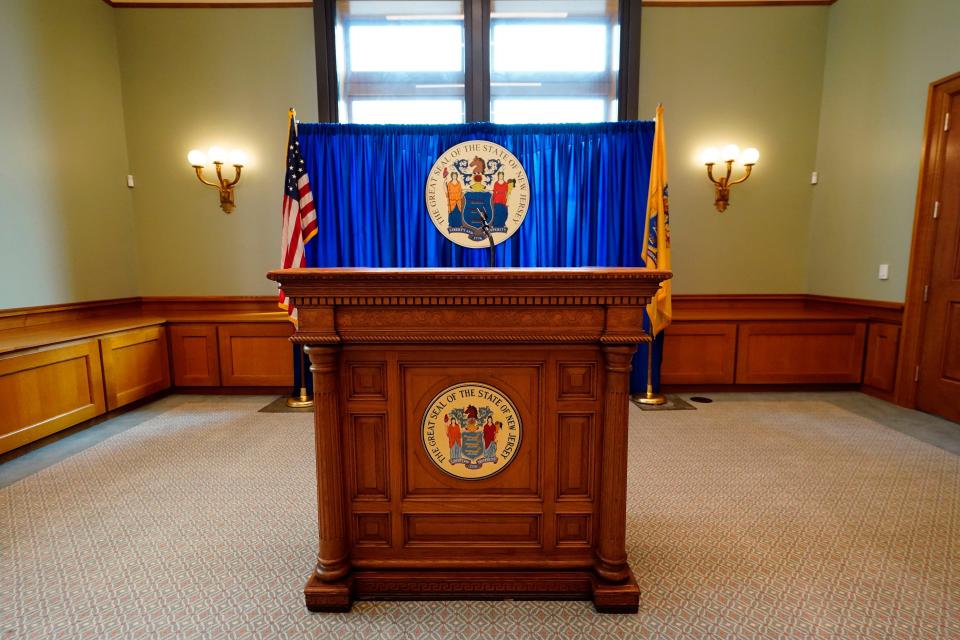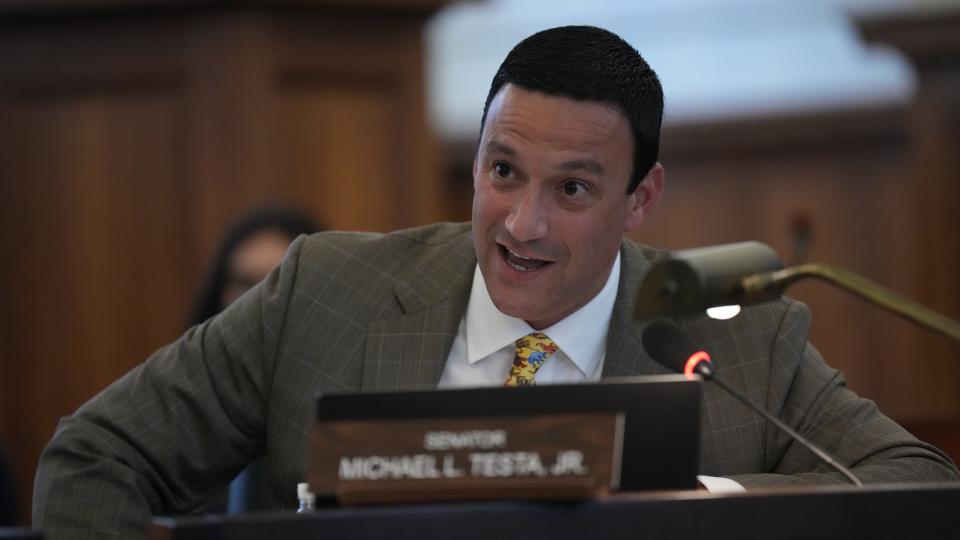Why NJ election realities spell danger for GOP and Democrats alike | Stile
Voters going to the polls Tuesday could decide the future agenda of the New Jersey Legislature.
But the pivotal race could also be shaped by actions of the past.
Thirteen years ago, lawmakers from both parties voted to give school districts the option of holding school board elections in November instead of April. The change meant low-voltage school board contests would now share the same general election ballot with candidates for federal, state and local offices.
While hailed as a way to save taxpayer money and drive up voter participation, some lawmakers feared that the change would politicize local school board races, turning mostly nonpartisan candidates into cogs of county political machines.

And others argued that debate over micro, but crucial school district concerns would be eclipsed by the larger, well-funded contests for public office. Yet, despite the hand wringing, most districts have since made the switch to November.
But this year, when all 120 seats in the Legislature are atop the Nov. 7 ballot, those brushed-aside concerns of the past may prove prescient - though with a twist.
School votes concern Democrats, GOP alike
Instead of the board of education contests being swallowed up by the higher-profile contests for public office, this year’s school board races could play a significant role in shaping the outcome of legislative races topping the ballot.
For much of the past year, a grassroots debate over when and how a school should notify parents about students' gender identities has roiling board meetings.
Now, the worry among Democrats is that anger about so-called parental rights from an apparently growing suburban cohort could drive up Republican turnout at the polls on Tuesday, giving the GOP a chance of picking more seats in both the Assembly and the state Senate. The decision to move elections in 2011 may could produce unintended consequences in 2023.
The past also looms over the race in another way.
The damage of former President Donald Trump’s nonstop conspiracy disparaging of mail-in voting in the 2020 presidential election still shadows the Republican get-out-the-vote plans in New Jersey.
What you should know: Our guide to New Jersey's 2023 elections for Legislature, local offices and school boards
Trump lashed out at mail-in voting as states around the country broadly expanded the use of the voting method during the pandemic. But Trump attacked the move, and warned in often ominous tones and without evidence that voting by mail was part of a grand scheme by the Democrats to steal the election. "Fraud" became his go-to word of attack.
Millions of Republicans listened and heeded his instructions to reject mail-in voting and go to the polls to cast their ballots in person on Election Day. Meanwhile, Democrats and unaffiliated voters embraced the vote-by-mail method and continued to do so in the subsequent elections. People simply like the convenience.
The growing popularity of voting by mail, and expanded early voting hours, has given Democrats a decided advantage. Since 2020, the party has headed into every Election Day with a built-in surplus of votes, placing heavy pressure on the Republicans to play catch-up.
As of last Thursday, New Jersey Democratic voters had cast 237,000 votes by mail, which is three times more than Republican voters, according to Ryan Dubicki, an elections analyst for the Associated Press. The ghost of Trump continues to shadow the vote counts.
Republicans bank on parental rights, schools
Republicans have stoked a whole range of culture war issues in this election, hoping to stir confusion and anger at the Democrats by painting them as out-of-touch “woke” warriors for Gov. Phil Murphy.
But perhaps the most inflammatory involve public schools — the debate over book banning, a revision of sexual education curriculum and, most prominently, a debate over parental rights involving the school's responsibility in notifying parents when a student begins identifying with a different gender.
Nine New Jersey school districts have repealed a State Board of Education policy — No. 5756 — that requires school officials to first confer with a transgender student to determine whether they want their parents notified. The policy is designed to protect children from a possibly violent reaction from some parents.
Right-wing groups that began populating school boards with candidates over the past couple of years lashed out the policy, which stems from a 2017 law passed with bipartisan approval and signed by outgoing Governor Christie.
Yet, the parental right's activists asserted that the policy robs parents of their fundamental rights to supervise their children and framed it as part of a larger LGBTQ agenda to indoctrinate or “groom” youth.
Issues driving the NJ vote: Parental rights issue likely to spur voters in contentious NJ school board races
Defenders of the policy call that conspiracy-theory nonsense and say the policy is designed to prevent arbitrary and possibly dangerous “outing” of vulnerable students.
Still, Republican legislative candidates, eager to tap the grassroots anger, pounced on the issue and made it the cornerstone of their attack literature and ads. Some GOP attacks have teetered on the absurd.
“Taking children from parents who don’t want their boy turned into a girl? It’s now the law,” exclaims the narrator in a cable TV ad attacking Democratic state Sen. Paul Sarlo and Assemblymen Gary Schaer and Clinton Calabrese of the 36th District in Bergen and Passaic counties. The ad then features a cartoon of a woman pulling down a zipper from her face to reveal a bearded man underneath.
Yet state Sen. Michael Testa, R-Vineland, who is also the Cumberland County Republican Party chairman, said the move school board elections to November is going to “haunt” Democrats because parental rights is “polling as the number one issue in this election cycle.”

“I don’t believe this is a Republican issue. I don’t believe this is a Democrats' issue," Testa said. "I think this is a New Jersey parents' issue when they are hearing that they need to co-parent with the state of New Jersey and their school system.”
But the emotional fury unleashed by the issue is hard to gauge, and it’s unclear how many of the school board contests are engulfed in the parental rights controversy. There are more than 1,800 candidates seeking 1,487 seats, reports the New Jersey School Boards Association.
Still, some incumbent Democrats in competitive in legislative districts like the 38th in Bergen County and the 11th in Monmouth County have distanced themselves from the policy on the campaign trail.
More Charlie Stile: Can NJ Democrats spin their wind power debacle? They're facing rough seas
Assembly Majority Leader Lou Greenwald, D-Cherry Hill, the author of the 2011 bill that gave school districts the option of moving board elections, dismissed suggestions that the parental rights debate illustrates the risks of holding school and governmental elections on the same day.
He said the new law has saved taxpayers money by reducing costs by merging the elections. He also said the Republicans would have campaigned on the issue regardless and he downplayed concerns that a “fringe” issue has created an Election Day turnout juggernaut of GOP voters.
“There are two ways to communicate to the public — communicate through fear and communicate through hope," Greenwald said. “The Republican Party has lost the message of hope. So they tried to scare people.”
Can Democrats capitalize on early voting turnout?
While Trump is largely responsible for the discrediting of early voting — and forcing the GOP to play catch-up each year — the New Jersey GOP also helped sow public doubt by joining the Trump in court in August 2020 to try and freeze Murphy’s executive order requiring mail-in ballots to be sent to 6.2 million homes.
Testa, who was one of the lawyers for the state GOP effort to halt the universal voting, said the suit sought to stop what they considered Murphy’s unconstitutional exercise of power. Such a sweeping change in voting method needed to be approved by lawmakers first, they asserted.
Yet during the case, the GOP also echoed Trump’s voter fraud claims, asserting that the rush to shift to “universal vote by mail elections” would eventually facilitate “fraudulent and invalid votes." A federal judge tossed out the suit in October.
Since then, the Democrats have succeeded in building a pre-election firewall of mail-in votes, an advantage augmented by the creation of an early voting period that begins 10 days before Election Day. That advantage hasn’t always produced slam-dunk victories.
In fact, in the 2021 elections, when the governor’s race topped the ballot, Republicans picked up seven seats despite the Democrats' mail-in ballot lead in each of those districts, according to an analysis by Micah Rasmussen, director of the Rebovich Institute for New Jersey Politics at Rider University. Still, that surplus of early votes may have prevented worse losses.
This year, turnout is expected to be low — the last time both house of the Legislature topped the November ticket was 2011, when only 27% of registered voters cast ballots. That’s why the early advantage for Democrats could mean the difference between the party retaining majority control and losing it for the first time in two decades.
Mike Kelly: I voted early in NJ. It works, it's here to stay and we must embrace it
“It doesn't matter much in a presidential election in New Jersey, because everyone's going to turn out anyway,’’ said Dan Cassino, a political science professor and pollster at Fairleigh Dickinson University. "But a low-turnout election like this? Yeah, I think it matters a lot.”
The GOP acknowledges the need to bolster mail-in and early voter turnout, and it has sent mailers to voters' homes encouraging them to send in their ballots.
Shaking off the Trump's damaging fraud claims has not been easy and some suspicions persist in the GOP rank and file.
Testa said he “took some shots” from party regulars as county chairman for eventually embracing mail-in and early voting as county chairman last year. But now he is quick to boast of the “robust” mail in campaign that helped lead to a GOP sweep of Cumberland County government. He’s now a convert, evangelizing the need for his party to step up the vote-by-mail effort.
“I see the chasm of which you speak," Testa said of the current Democratic lead. “I think it would behoove every GOP organization across the state to adopt a very robust and efficient vote-by-mail program.”
Charlie Stile is a veteran New Jersey political columnist. For unlimited access to his unique insights into New Jersey’s political power structure and his powerful watchdog work, please subscribe or activate your digital account today.
Email: stile@northjersey.com
This article originally appeared on NorthJersey.com: NJ election: Dangers for Democrats, GOP in voting mechanics

